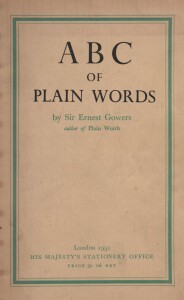 When some BBC journalists don’t know the difference between reticent and reluctant, and use the word enormity to mean an enormous event, popular grammarians, such as Liz Truss or Ernest Gowers, who was her equivalent in the 1950s, are needed more than ever. That’s if these pisspoor journalists can be bothered to read their books.
When some BBC journalists don’t know the difference between reticent and reluctant, and use the word enormity to mean an enormous event, popular grammarians, such as Liz Truss or Ernest Gowers, who was her equivalent in the 1950s, are needed more than ever. That’s if these pisspoor journalists can be bothered to read their books.
Sir Ernest Gowers was a senior civil servant whose best-selling popular grammar Plain Words (1948), was devised to help his fellow civil servants write clear and correct English. In 1951, admitting that its format could be improved, Gowers brought out ABC of Plain Words.Nearly 70 years on this guide can still be used alongside other more recent grammars, such as Lynne Truss’s Eats, Shoots and Leaves. Most of the advice proferred by Gowers still applies, but some might raise a few eyebrows among the journalists of today. Here are a few words and their definitions that might provoke discussion today.
Deadline.This is a word known to all hacks, but Gowers chooses to define deadline conventionally as ‘ a line drawn round a military prison beyond which a prisoner may be shot down’. I don’t know which dictionary Mr Gowers was using, but the Chambers dictionary we use here at Jot HQ gives two definitions besides this one—1) ‘ the time that newspapers, books etc going to press’ 2) ‘a fixed time or date terminating something’. Gowers doesn’t even mention what ninety percent of people nowadays (and probably in 1951 too) would recognise as the most common definition of deadline.
Decimate.Gowers is right about the word decimate, however. He defines it as meaning to reduce by one tenth, not to one tenth. No writer today should get away with saying that troops were decimated, mainly because no-one would possibly know that soldiers in a battle could be reduced by exactly one tenth !
Dilemma.This is another word of precise meaning. It does not mean that someone has a number of difficult courses of action. He or she has exactly two. Continue reading
